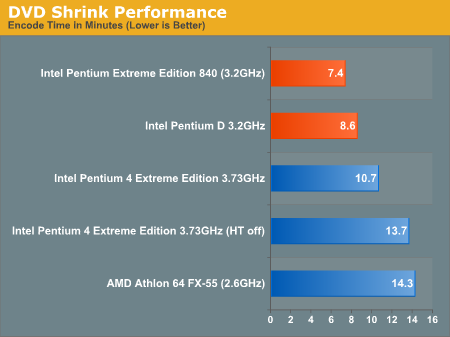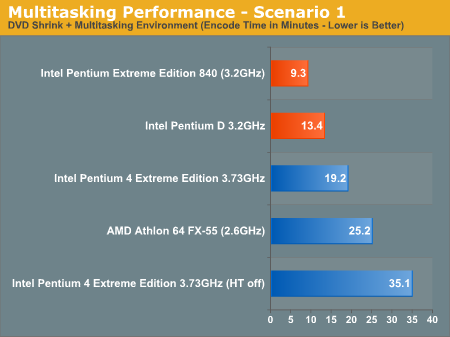Intel Dual Core Performance Preview Part I: First Encounter
by Anand Lal Shimpi on April 4, 2005 2:44 PM EST- Posted in
- CPUs
Multitasking Scenario 1: DVD Shrink
If you've ever tried to backup a DVD, you know that the process can take a long time. Just ripping the disc to your hard drive will eat up a good 20 minutes, and then there's the encoding. The encoding can easily take between 20 - 45 minutes depending on the speed of your CPU, and once you start doing other tasks in the background, you can expect those times to grow even longer.
For this test, we used DVD Shrink, one of the simplest applications available to compress and re-encode a DVD to fit on a single 4.5GB disc. We ran DVD Decrypt on the Star Wars Episode VI DVD so that we had a local copy of the DVD on our test bed hard drive (in a future version of the test, we may try to include DVD Decrypt performance in our benchmark as well). All of the DVD Shrink settings were left at default, including telling the program to assume a low priority, a setting many users check in order to be able to do other things while DVD Shrink is working.
As a single application with no multitasking involved, here's how DVD Shrink performs:

As you can see, the new dual core chips can shrink a DVD in about 70% of the time of the 3.73EE. But what happens to performance when you start doing other things in the background?
In order to find out, we did the following:
1) Open Firefox and load the following web pages in tabs (we used local copies of all of the web pages):
We kept the browser on the AT front page.
2) Open iTunes and start playing the latest album of avid AnandTech reader 50 Cent on repeat all.
3) Open Newsleecher.
4) Open DVD Shrink.
5) Login to our news server and start downloading headers for our subscribed news groups.
6) Start backup of Star Wars Episode VI - Return of the Jedi. All default settings, including low priority.
DVD Shrink was the application in focus; this matters because by default, Windows gives special scheduling priority to the application currently in the foreground (we will test what happens when it's not in the foreground later in this article). We waited until the DVD Shrink operation was complete and recorded its completion time. Below are the results:

Now, we start to see where dual core helps. In this relatively simple multitasking scenario, the DVD shrink task took more than twice as long on single core CPUs than it did on dual core chips. The Pentium 4 without Hyper Threading took a full 35 minutes to complete the task, compared to the 9.3 minutes of the dual core Pentium Extreme Edition. Even the fastest from AMD couldn't hold a candle to the dual core offerings.
And this was only with a minimal amount of multitasking. Had more applications been running or had actual user interaction taken place during the test, the dual vs. single core gap would've grown even more.










141 Comments
View All Comments
haveblue128 - Wednesday, July 6, 2005 - link
Only downside but I think a majorleague heat solution should make everything sweethaveblue128 - Wednesday, July 6, 2005 - link
Oh Please give us a break. If you want to be a purist, go live in the woods without clothes. I say that multitasking makes my day a breeze.Whats your dilemma??
haveblue128 - Wednesday, July 6, 2005 - link
Wow-I just purchased a new sys with an Intel Dual CPU setup. As a multitasking monster on my machine, I was always having crashes in the past.I think that is gone with George Bush in 2008. THe good news is the dual core pair is already hear and ready to run. Give them a try-no downside, albeit a good bit of heat. That is something I will need to work on, but....
peufeu - Monday, May 9, 2005 - link
I forgot to mention... gentoo linux ;)peufeu - Monday, May 9, 2005 - link
Dual CPUs to compensate for the inept MS Windows.Interesting.
I'm torturing a webserver I just wrote, on my laptop. It's in Python. Right now it's serving about 2000 requests per second with 1000 concurrent connections.
I don't even notice it's running. The CPU gauge is at 100%, so what ? Nothing special. As reactive as usual. It doesn't swap. The harddisk even put itself in standby....
Go, bill, go !
shady28 - Sunday, April 17, 2005 - link
Making special tests just for these processors seems a bit contrived to me. In particular, comparing dual core processors to a Pentium 4 with HT disabled, in a multithreading/multitasking benchmark, is just plane lame.
I would have been a lot more interested in seeing how dual core compares in multitasking vs dual opterons or dual Xeons. Right now it looks like dual core is slower at doing one task at a time, suprisingly not that much faster at doing two tasks at a time than HT Pentium 4s. The only exceptions were the off the wall tests done at the end.
Since these new 'benchmarks' are made to simulate 'real life use', does that mean that all Anand's previous reviews were bogus?
JimGunn - Wednesday, April 13, 2005 - link
I think I will want one of these for my next video editing & encoding workstation. Will come in handy for HDV post I am sure!BoBOh - Monday, April 11, 2005 - link
Where are the code compile tests. We're not all gamers, some are software developers! :)BoB
warath - Friday, April 8, 2005 - link
I can't wait to see 64-bit dual cores! :)WoodenPupa - Thursday, April 7, 2005 - link
Well, I'm not a tech whiz like everyone else here, but here's my 2 centavos...I can attest to the fact that every machine I ever buy, I bring it to its knees. I usually wait several generations before I upgrade in order to get a more profound effect. Yet that strategy doesn't seem to matter because no matter how fast my computer is, I find that my NORMAL computing habits end up crushing the CPU and everything else.
I use Cool Edit Pro and some other audio programs, and I am also a chess player, and like to anyalyze games in the background with Fritz or Chessbase, both of which allow for gigantic hash tables. So as a typical case I like to do wave transforms and chess analysis as background items while I compose e-mails or use Word for more serious writing. Naturally I like to listen to music at the same time, but usually I have to give that up. Needless to say, all of this stuff cripples my computer---I'm due for an upgrade, I know---my box is a 2.53 GHz P4, 1 GB of Rambus 800 (no groaning, please), a GF4 ti 4600, 120 GB HD, I'm not even sure what the cache on that is, I don't think it's 8 or 5 MB---feels more like 2.
I usually end up quitting the Chess program or the Mp3 player---once in a while I can do all of this stuff concurrently if the wave transforms on cool edit aren't too complex, and I minimize the hash tables on the chess program.
Ideally I want everything to be instantaneous, but...:) Anyway, from what it sounds like, I need a dual or even quad processor setup. Because even with all the above mentioned programs running, I can think of more I would like to add. I'm a monster multitasker and really like to kick a computer right in the face, to show it who's boss. I'm tired of winning, though---I'd love it if one day the computer just scoffed at everything I threw at it. Sadly, I don't think it'll happen in my lifetime.
Should I upgrade to a dual core, or should I save and get a true multi-CPU Mobo like a quad Xeon??